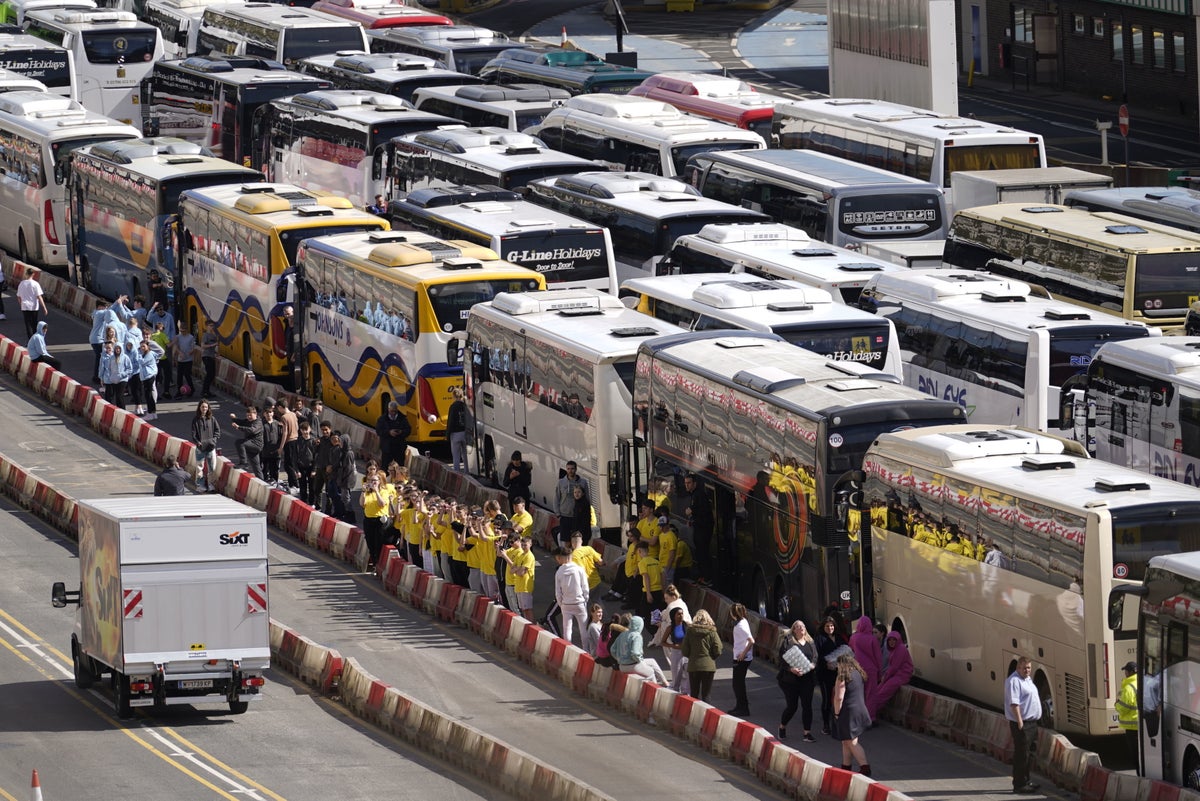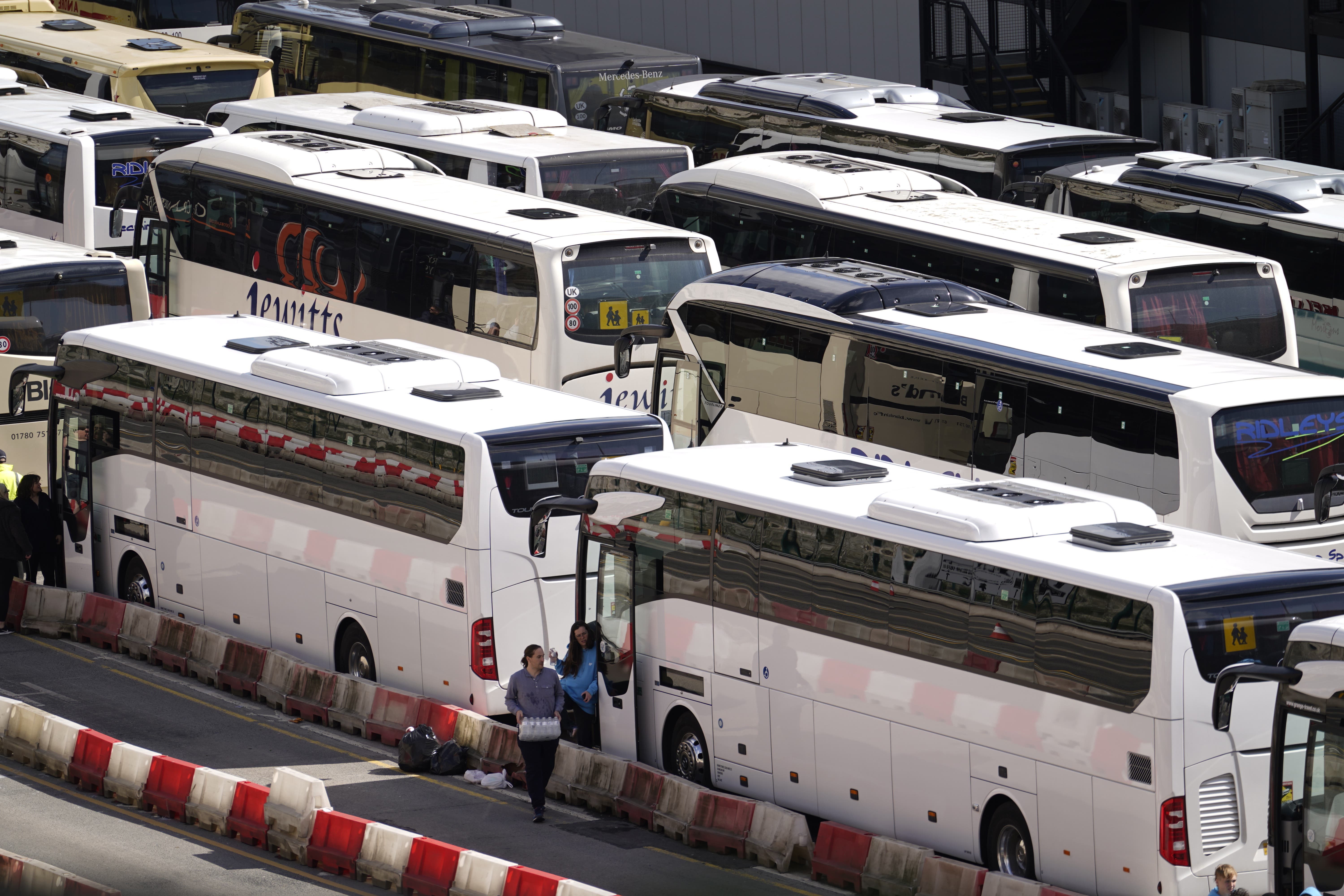
No 10 has admitted that “new processes” brought in after Brexit has contributed to several days of travel chaos at the Port of Dover.
It comes as the Confederation of Passenger Transport (CPT) called for “crisis talks” with the Rishi Sunak’s government, the Kent port and ferry companies to “resolve this mess once and for all”.
The coach operators’ body claimed their vehicles were “treated unfairly” after thousands of passengers were stranded in lengthy queues for up to 24 hours over the weekend.
Mr Sunak’s official spokesman said “a combination of factors” were to blame, including poor weather, the high volume of traffic and the new passport control processes.
Asked about the role of post-Brexit checks, the spokesman acknowledged that French officials are now required inspect and stamp every passport as passengers leave the UK.
“Obviously we recognise there are new processes in place,” Mr Sunak’s spokesman said on the manual checks.
“That’s why authorities were given a long time to prepare for the new checks including during the transition period, of course, and we are in discussion with our French counterparts about how we can further improve the flow of traffic.”
The No 10 officials said the government was “working with our French counterparts in increasing our ability to move traffic and passengers through freely”.
Suella Braverman was accused of being in “complete denial” about Brexit after the home secretary claimed on Sunday it was unfair to say the huge hold-ups at Dover were “an adverse effect of Brexit”.
The queues of travellers heading to Europe for Easter had cleared by Monday morning, but there are fears the congestion could return during other peak periods due to French border officials carrying out extra checks following Brexit.
The Confederation of Passenger Transport (CPT) claimed coaches were “held back behind cars and HGVs”, meaning some of their passengers were delayed for up to 24 hours. The travel body said it fears the situation “will only get worse” when the start of the summer holiday period arrives.

CPT chief executive Graham Vidler said: “The procedures to enter the EU should not have a negative impact on people who don’t want to fly or drive by car to continental Europe.
“We’re calling on the government, the Port of Dover and ferry companies to get round the table with the coach sector to resolve this mess once and for all.”
Senior Tory MP Tim Loughton has claimed that a lack of staff at the French border control is to blame for delays at Dover – not Brexit. “It’s very fashionable to blame everything on Brexit,” he told Times Radio.
Mr Loughton, former chair of the home affairs select committee, said the lack of French border staff is causing the problems. “It’s because there were not sufficient border force people there from the French equivalent checking those passports.”

Sir Keir Starmer said Brexit “has had an impact” on cross-Channel journeys after a weekend of disruption at the Port of Dover, urging the Sunak government to “get a grip”.
The Labour leader told LBC: “Of course Brexit has had an impact – there are more checks to be done. That doesn’t mean that I am advocating a reversal of Brexit, I am not. I have always said there is no case now for going back in.”
Julia Lo Bue-Said, chief executive of Advantage Travel Partnership, the UK’s largest network of independent travel agents, described the situation at Dover as “distressing”, adding: “It is clear that the Brexit impact has not been adequately planned for.”
Eurostar revealed earlier this year that it is forced to leave hundreds of seats empty on trains to and from London St Pancras to avoid long queues at stations.
The cross-Channel train operator said this is largely due to a reduction in the number of border officials, but also blamed the stamping of UK passports post-Brexit.
Asked about the possibility of further disruption ahead, Mr Sunak’s spokesman said: “We’re working with the Kent resilience forum, who are responsible for plans and operation decisions, to cope with the potential for disruption and high volumes of traffic.
“We’re working with port authorities, the operators and the French government to keep any potential for disruption to a minimum.”







